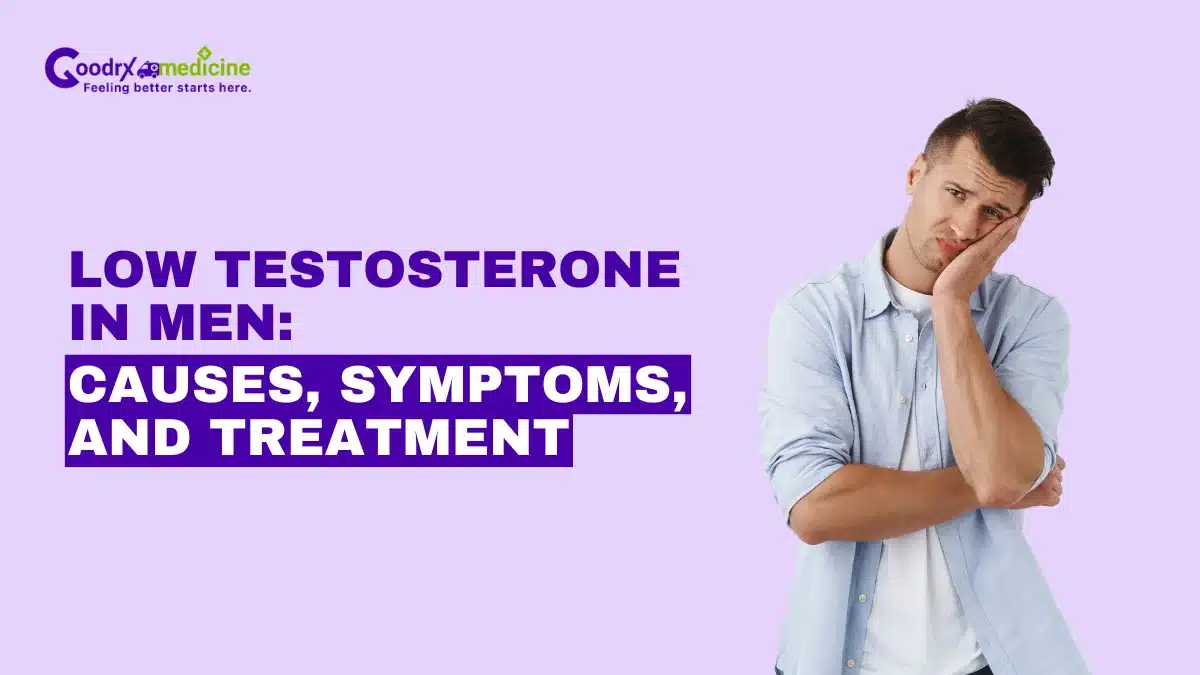Testosterone is an important hormone. It helps with sex drive, energy, mood, muscle strength, and bone health.
Many men worry when they hear the words low Testosterone. About 2 out of 100 men have Low Testosterone, also called low T or Male Hypogonadism. Low Testosterone happens when the testicles don’t make enough of this vital hormone. The number increases with age, with about 40% of men over 45 experiencing this condition.
When the body produces too little Testosterone, men may notice changes like low sex drive, muscle loss, and weaker bones. These symptoms can feel worrying, but understanding what causes low Testosterone in men helps reduce anxiety and opens the door to effective treatments.
Low Testosterone is treatable. This article explains the signs, treatments, and causes of low Testosterone in men and shares natural remedies to help you manage low Testosterone confidently.
Keep reading to learn more and take control of your health.
Symptoms and signs of low Testosterone in men
Before discussing the signs and symptoms of low Testosterone in men, it’s important to note that some symptoms can be due to aging.
A decrease in sexual interest may result from aging and not because of any sexual health condition. However, having severe or persistent low Testosterone symptoms in men might indicate a need for medical attention.
While some men with low Testosterone may not experience noticeable symptoms, others might face the following symptoms. Symptoms or side effects of low Testosterone in men are:
- Low sex drive
- Erectile Dysfunction
- Low sperm count
- Sleep disturbances
- Poor muscle mass
- Bone density reduction
- Surplus body fat
- Mood changes, including Depression
- Concentration difficulties
Additionally, low Testosterone during puberty in individuals assigned male at birth (AMAB) could lead to growth issues, less pubic hair, and slower genital development.
What causes low Testosterone in men
Besides aging, other reasons that can cause low Testosterone in men include:
- Taking certain medicines, like chemotherapy
- Injury or Cancer in the testicles
- Problems with the brain glands called the hypothalamus and pituitary, which control hormone levels
- Thyroid problems
- Being overweight (obesity)
- Chronic illnesses, infections, or medical treatments
- A condition called male Hypogonadism
Male Hypogonadism, which means low Testosterone production, is a common condition in men. There are two major types of Hypogonadism: Primary Hypogonadism and Secondary Hypogonadism. Each type has different causes.
Primary Hypogonadism
Primary Hypogonadism, also called primary testicular failure, happens when the testicles do not make enough Testosterone. This problem comes from the testicles themselves.
Common causes of Primary Hypogonadism are:
- Klinefelter’s Syndrome: Men with this condition have an extra X chromosome (X, X, and Y), which can stop the testicles from developing normally and lower Testosterone production.
- Undescended testicles: Sometimes, in some babies, the testicles do not move down into the scrotum before birth. This may fix itself early in life, but if not treated early, it can cause problems with Testosterone.
- Mumps Orchitis: A mumps infection can damage the testicles and reduce Testosterone.
- Hemochromatosis: Excessive iron in the blood can harm the testicles or pituitary gland, lowering Testosterone.
- Injury to the testicles: Because they are outside the body, they can get hurt easily, and damage can reduce Testosterone.
- Cancer treatment: Chemotherapy or radiation can temporarily or permanently lower Testosterone and sperm production.
- Normal aging: Testosterone naturally decreases as men age. A study published in the International Journal of Health Sciences in 2018 states that this decline often starts after age 30.
In Primary Hypogonadism, the testicles make little or no Testosterone because they are damaged or removed.
Mumps: It is a viral infection that affects the salivary glands and can cause inflammation in the testicles.
Secondary Hypogonadism
Secondary Hypogonadism happens when the brain parts that control hormone production, the hypothalamus or pituitary gland, do not work correctly because of insufficient stimulation of Leydig cells. This causes the testicles to receive fewer signals to make Testosterone.
Common causes of Secondary Hypogonadism include:
- Kallmann Syndrome: A condition where the hypothalamus develops abnormally, causing delayed puberty and low Testosterone.
- Pituitary disorders: Surgery or illness affecting the pituitary gland can stop it from sending signals to the testicles.
- Inflammatory diseases: Some diseases can harm the hypothalamus or pituitary gland, lowering Testosterone.
- HIV/AIDS: This illness can affect the brain and testicles, reducing Testosterone.
- Medications: Some medications, like opiate painkillers, can lower Testosterone.
- Obesity: Being significantly overweight can cause low Testosterone, but losing weight may help.
- Stress: High stress raises cortisol, which can lower Testosterone.
- Normal aging: Aging can also cause problems in the hypothalamus or pituitary, reducing Testosterone.
Both Primary and Secondary Hypogonadism lead to low Testosterone, but they come from different parts of the body that do not work well. Understanding these causes helps doctors find the proper treatment.
Diagnosis and test for low Testosterone in men

The most crucial diagnostic measure is a blood test to measure Testosterone levels.
Doctors may also consider other symptoms and conduct additional tests, such as blood tests for Luteinizing Hormone (LH), Prolactin, Hemoglobin, and other related hormones.
Imaging tests like MRI may also help identify underlying causes.
Treatment for low Testosterone in men
Various treatment options help men with low Testosterone levels. Using these treatments only when a doctor prescribes them is essential because some may have side effects.
Medical treatment
Testosterone Replacement Therapy is a popular and common approach for treating low Testosterone.
This therapy includes:
- Skin gels
- Intramuscular injections
- Testosterone patches
- Testosterone pills
- Buccal Testosterone tablets
- Testosterone nasal gel
- Oral Testosterone
However, men with specific health problems, like Prostate Cancer or uncontrolled Heart Failure, should avoid TRT. Always buy Testosterone products from trusted and licensed sources such as GoodRxMedicine to ensure safe and effective treatment.
Low Testosterone can also cause Erectile Dysfunction, and doctors may prescribe ED medicines like Viagra or Cialis to help with this condition. Always consult a doctor before starting any Testosterone treatment or medication.
Natural remedies for low Testosterone in males
Some men choose natural remedies because they are safer and have fewer side effects, although they take longer to work. Natural ways to boost Testosterone include:
- Exercising and lifting weights
- Eating a balanced diet with protein, fat, and carbohydrates
- Reducing stress
- Getting enough vitamin D
- Taking Zinc supplements
- Sleeping well
- Avoiding chemicals that act like Estrogen and limiting alcohol
- Eating foods that boost Testosterone, like pomegranates and oysters
- Reducing plastic use
Making these lifestyle changes can help raise Testosterone levels over time. Though they may not work as quickly as medical treatments, they support overall health and hormone balance.
Conclusion
Low Testosterone in men is a common but treatable condition. It can cause many symptoms, such as low sex drive, Erectile Dysfunction, poor muscle mass, mood changes, and trouble concentrating. Some men may not notice any symptoms, while others might experience several issues that affect their daily lives.
Causes of low Testosterone in men can range from natural aging and certain medications to injuries, obesity, and medical conditions like Hypogonadism. Although Primary and Secondary Hypogonadism have different causes, both lead to Low Testosterone. Men of all ages can be affected, with lifestyle factors and age playing essential roles.
Diagnosis usually involves blood tests and sometimes imaging. Treatment options include medical approaches like Testosterone Replacement Therapy and natural remedies such as exercise, a balanced diet, and stress reduction. Addressing low Testosterone with the proper treatment and healthy habits can improve men’s health and overall quality of life.
Frequently Asked Questions
What is considered low Testosterone in males?
Low Testosterone in men means your blood has less than 300 nanograms per deciliter (ng/dL). For younger men, levels below 350 to 410 ng/dL may be low. Dangerously low Testosterone is much lower, often below 200 ng/dL, which can cause severe symptoms.
Can low Testosterone be prevented?
Yes, you can help prevent low Testosterone by living a healthy life. You should eat good food, exercise regularly, get enough sleep, and reduce stress. Avoid smoking, too much alcohol, and harmful chemicals. These habits keep your body strong and help keep your Testosterone levels normal.
Does masturbation cause low Testosterone?
No, masturbation does not cause low Testosterone. It is a regular activity and does not lower your Testosterone levels. Your body keeps making Testosterone no matter how often you masturbate. So, you don’t need to worry about it affecting your hormone levels or health.
Are there specific symptoms that indicate low Testosterone before puberty?
Yes, specific symptoms indicate low Testosterone before puberty in boys. These symptoms include slowed height growth and disproportionately long arms and legs. Boys may also show reduced pubic hair, underdeveloped genitals, a high-pitched voice, sparse body hair, and sometimes Gynecomastia (breast enlargement).
When referencing outside resources, GoodrxMedicine always provides full citations. To learn more about the measures we use to maintain the quality of our content, please review our Content Information Policy.















